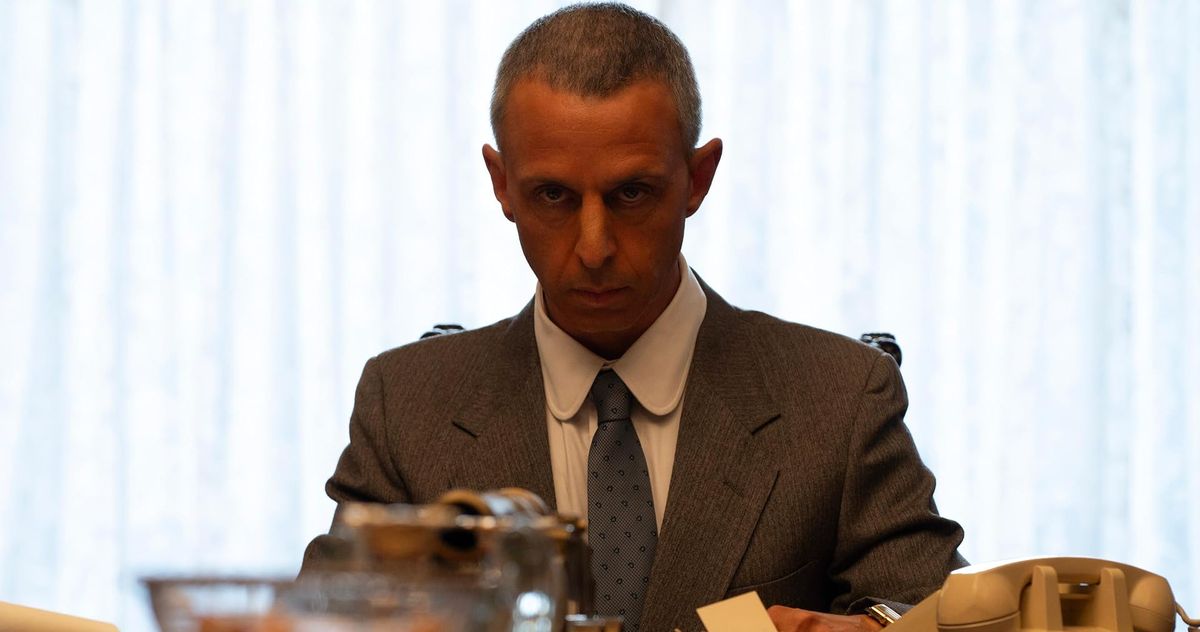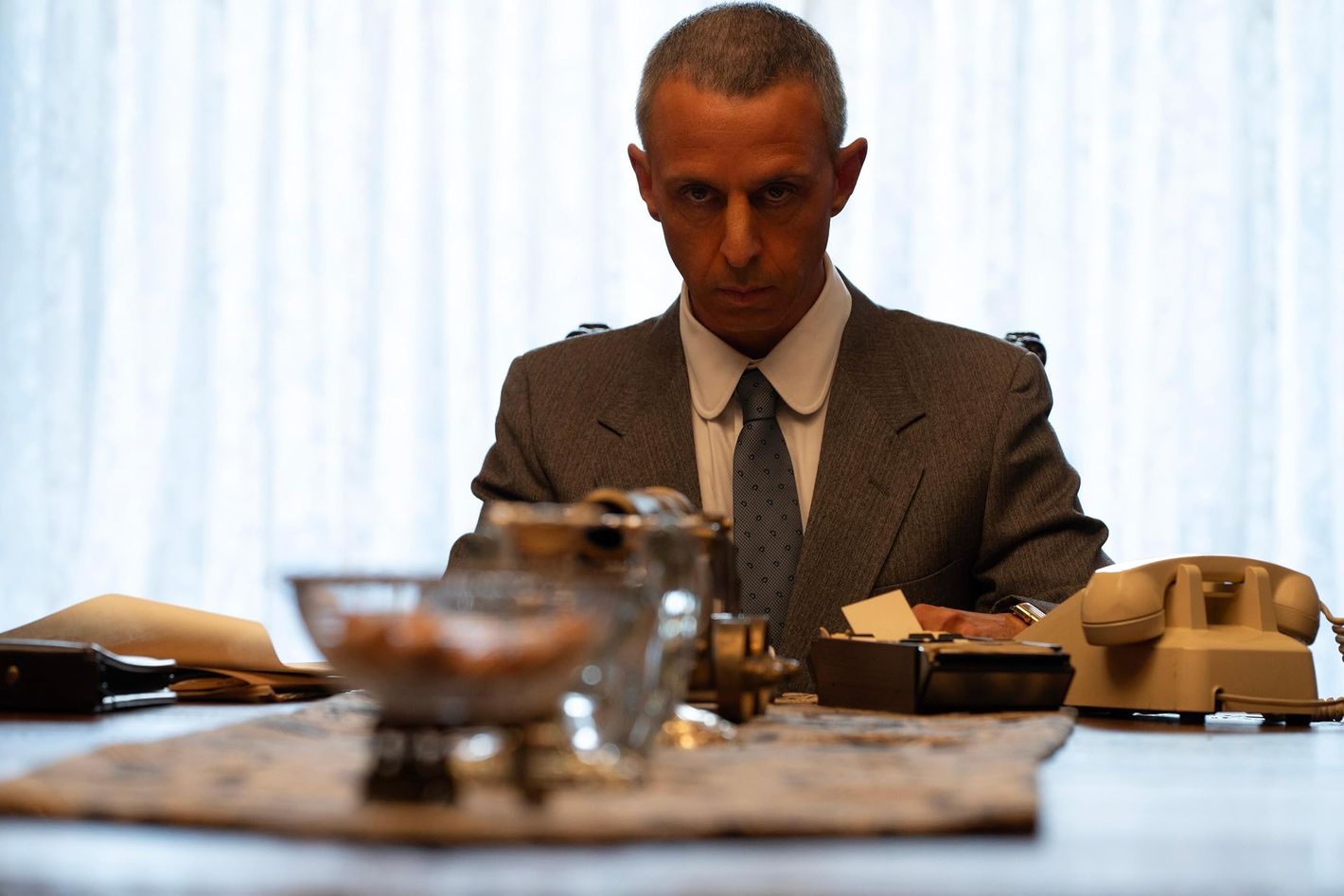He Overacted. He Did Too Much. He Deserves the Oscar.
Jeremy Strong is doing something that very few supporting actors are willing, or even empowered, to do nowadays. Reward him for it.


On Oscar night 2025, Jeremy Strong will most likely lose out in Best Supporting Actor to his Succession castmate Kieran Culkin, and it will be to absolutely no one’s surprise. Culkin has swept just about all of the awards-season precursors, and his lovely performance as an alternately charming, infuriating, manic, troubled American tourist in Jesse Eisenberg’s very good A Real Pain deserves the acclaim.
Culkin aside, Strong isn’t even the guaranteed runner-up in his category. It’s rare for me to find every single nominee deserving of the award in a given Oscar category, but that is certainly the case this year. Guy Pearce might secretly be the best thing about Brady Corbet’s The Brutalist. Edward Norton reminds us all just how good he is with his turn as Pete Seeger in James Mangold’s A Complete Unknown. (Watch that movie and then watch his Oscar-nominated performance in 1998’s American History X to get an idea of Norton’s profound range.) And Yura Borisov’s Igor in Sean Baker’s Anora offers a clinic in how much a great actor can do with just glances and quiet reaction shots. (Watch Borisov in Juho Kuosmanen’s masterful 2021 drama Compartment No. 6 to see what he can do with a bigger role.)
Meanwhile, Strong is nominated for his performance as legendary right-wing attorney and fixer Roy Cohn in Ali Abbasi’s The Apprentice, which charts the early days of one Donald Trump (played by Sebastian Stan, who is also Oscar-nominated, for Best Actor). Overall, the film has gotten a mixed reception, and Strong’s character is pretty detestable. There have been startling upsets in Academy acting categories before, but if there is one on Oscar night 2025, it’s unlikely to go in favor of Strong.
Here’s the thing, though: Jeremy Strong’s performance is one of the absolute highlights not just of The Apprentice or of supporting-actor performances over the last year, but of all of 2024 film. If there were any true justice in the world (there’s not, in case you were wondering), he’d win the Oscar this year.
The Apprentice, which premiered at Cannes last year, tells the story of how veteran mover and shaker Cohn groomed and supported Trump in the 1970s and ’80s. It shows how Cohn instilled his facts-be-damned, dignity-is-overrated, win-at-all-costs philosophy into the impressionable, nascent real-estate mogul. An awkward milquetoast looking to get out from under his domineering father’s shadow, Trump found in Cohn an important ally to help him bulldoze past city regulators and bureaucrats. The film also portrays how an ascendant Trump cast Cohn off once the attorney came down with AIDS.
He knows that The Apprentice is at heart a Frankenstein movie, and his Cohn is the crazed doctor bellowing, “It’s aliiive!”
As Cohn, Strong goes big in a way very few actors are able to do convincingly nowadays. He’s not doing a full-on imitation; if you watch videos of Cohn, the real man seems more patrician and chummy in demeanor. Instead, Strong crosses a broad impression of the real Cohn with an almost surreal animalistic intensity. Watch the way he fixes his eyes on Stan’s Trump in their first scene together, as Roy spots Donald from across a private club. Then watch the way he toys with Trump in their first actual interaction — alternately flattering and humiliating him, like a predatory suitor. Strong turns the subtext of the character into the text of the performance. His line deliveries are relentlessly aggressive, his neck constantly bobbing out like a coked-up version of the frogs Cohn loved so much. This is like no human we’ve ever met — and therein lies his fascination, and Strong’s creativity.
It’s a dangerous gamble. One could easily be accused of overacting, of doing too much. (The closest recent analog I can think of is Adam Driver’s monumental performance in Ferrari, which was divisive, to say the least.) But Strong channels the spirit of people like Jack Nicholson and James Cagney in overpowering all our dumb assumptions about naturalism and authenticity. He knows that The Apprentice is at heart a Frankenstein movie, and his Cohn is the crazed doctor bellowing, “It’s aliiive!” to the thundering skies. Watching him, we experience both comic and tragic anticipation. We don’t know what he’ll do or say next, so we’re riveted. To put it another way: Roy Cohn has to cast a spell over Trump, or the picture won’t work. To do that, Jeremy Strong has to cast a spell over us.
To be fair, the picture itself doesn’t really work, but it’s not because of Strong’s performance. Rather, the film can’t quite live up to his performance, because we also have to understand what Cohn initially saw in Trump, and the movie seems too afraid to go there. Maybe that has to do with the fact that the filmmakers had (understandable) political aims in an election year, and they hesitated to suggest that — gasp — Donald Trump might have once had something resembling charisma. Stan’s performance is very good, but The Apprentice does fall apart once Cohn becomes less of a player in Trump’s story. Left to his own devices, the Donald of this movie is not a particularly interesting monster.
Strong himself inspires strong feelings, to say the least. Every time someone publishes an interview or a profile of him, social media becomes inundated with snarky comments on his process, his immersion into his roles, his serious dedication to his craft. As I’ve noted elsewhere, it sometimes feels like the public’s impression of Strong (as well as, occasionally, the media’s) is based as much on his try-hard Succession character Kendall Roy as it is on Jeremy Strong, the actual person. Maybe he invites it, to some degree. Maybe he embraces it. Maybe it just comes with having created a character who has captured the popular imagination to the degree Kendall Roy has.
But Jeremy Strong is also doing something that very few performers are willing, or even empowered, to do nowadays. With some great actors, each role feels like another variation in a long continuum; these are performers who seem so natural on-camera that we often get the impression they’re playing versions of themselves. (Culkin might be one of these, but so are people like Tom Cruise or Timothée Chalamet.) Some actors revel in the precision of their performances. (The young Daniel Day-Lewis was one, as was Laurence Olivier.) But with some actors, every time they do a part, it feels like they’ve created a whole new human out of thin air and given us something we’d never have seen otherwise. (Think Marlon Brando or Philip Seymour Hoffman.) Jeremy Strong’s film career is still relatively short, but this is the rarefied realm in which he currently finds himself. He won’t win that Oscar, but immortality is within reach.








